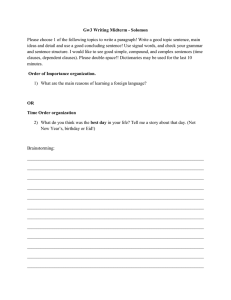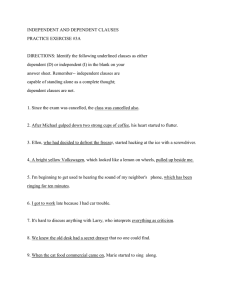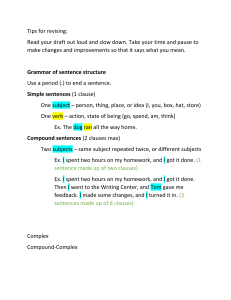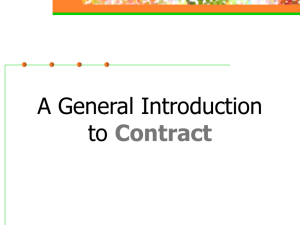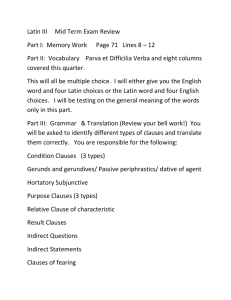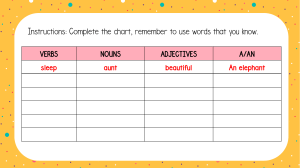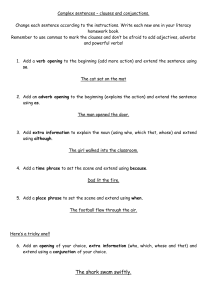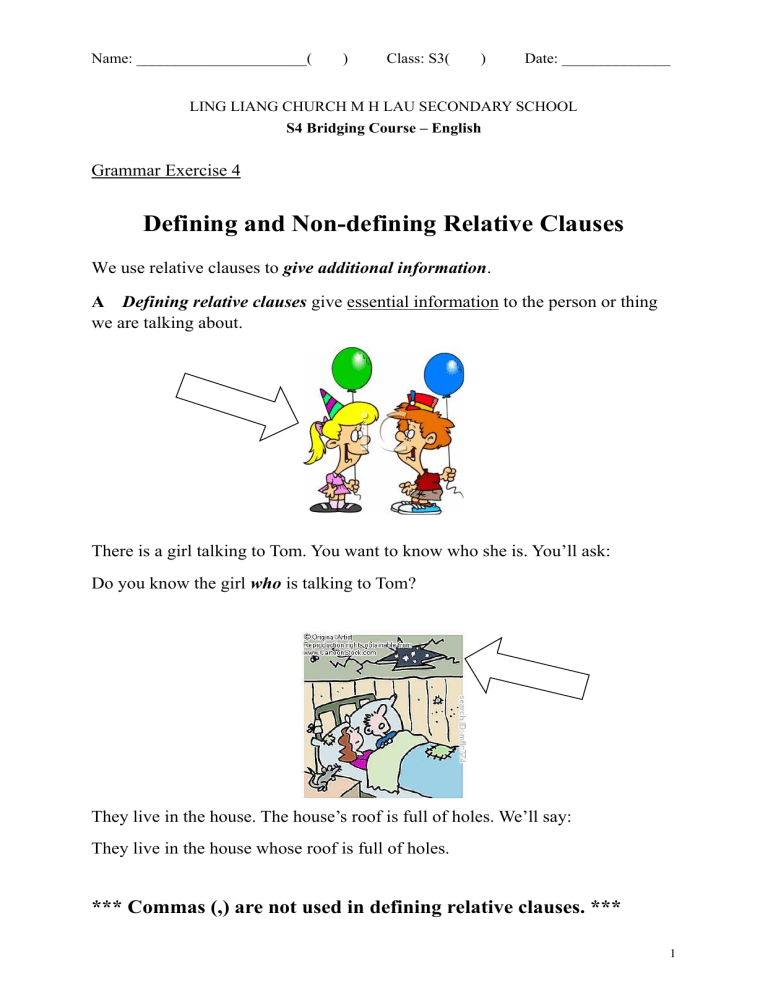
Name: ______________________( ) Class: S3( ) Date: ______________ LING LIANG CHURCH M H LAU SECONDARY SCHOOL S4 Bridging Course – English Grammar Exercise 4 Defining and Non-defining Relative Clauses We use relative clauses to give additional information. A Defining relative clauses give essential information to the person or thing we are talking about. There is a girl talking to Tom. You want to know who she is. You’ll ask: Do you know the girl who is talking to Tom? They live in the house. The house’s roof is full of holes. We’ll say: They live in the house whose roof is full of holes. *** Commas (,) are not used in defining relative clauses. *** 1 Name: ______________________( ) Class: S3( ) Date: ______________ The following relative pronouns are used in defining relative clauses. Person Thing Subject who which/that Object who/whom which/that whose whose Possessive Place where Time Reason when why B Non-Defining Relative Clauses give additional information, but the information can’t help us to identify the person of thing we are talking about. The clauses are put in commas. Compare: The Elephant that loves alligators is very unusual. (This tells us which elephant we are talking about.) Elephants, which are large and grey, can be found in zoo. (This gives us extra information about elephant) Relative pronouns in non-defining clauses Person Thing Subject who which Object who/whom which Possessive whose Place where 2 Name: ______________________( ) Class: S3( ) Date: ______________ Exercise 1 Fill in the correct relative pronoun (who / which). 1. This is the bank 2. The man was robbed yesterday. robbed the bank had two guns. 3. He wore a mask made him look like Mickey Mouse. 4. He came with a friend waited outside in the car. 5. The woman 6. The bag 7. The people 8. The car 9. The man gave him the money was young. contained the money was yellow. were in the bank were very frightened. the bank robbers escaped in was orange. drove the car was nervous. Exercise 2 Decide whether to use who or which. 1. The people built Stonehenge lived several thousand years ago. 2. The huge stones are more than 6 metres high weigh about 45 tons. 3. The smaller stones weigh about 4 tons and are from an area in Wales is 400 kilometres away from Stonehenge. 4. As Stonehenge lies in a large field, tourists come to this place can already see the stones from a distance. 5. Everybody has visited Stonehenge says that it is very impressive. 3 Name: ______________________( ) Class: S3( ) Date: ______________ LING LIANG CHURCH M H LAU SECONDARY SCHOOL S4 Bridging Course – English Too Much, Too Many, Too Few, Too Little, Enough A. too much, too many: more than necessary; use before nouns. Miss Fatt eats too much food. The green aliens have too many eyes. B. too little and too few: less than necessary; use before nouns. There is too little water in the desert. There are too few candles to light up the room. *** Remember*** More than necessary Less than necessary Before countable nouns Too many Too few Before uncountable nouns Too much Too little 4 Name: ______________________( ) Class: S3( ) Date: ______________ Exercise 1 Correct the following lines. 1. Mary has too few money to buy all the pencils. 2. There are too much bicycles on the road. 3. I put too many sugar in my tea. It’s too sweet now. 4. Jerry bought too little eggs to make pancakes for us. C. We use enough to describe the quantity is as much as necessary. (1) Enough + noun (enough money / enough people etc.) Is there enough sugar in your coffee? (2) Enough without a noun I’ve got some money but not enough to buy a car. = I need more money to buy a car. (3) Adjective + enough (good enough / tall enough etc.) Shall we sit outside? No, it isn’t warm enough. (not ‘enough warm) *** We say: enough for (somebody / something) enough to (do something) This pullover isn’t big enough for me. I haven’t got enough money for a car. I haven’t got enough money to buy a car. (not for buy a car) enough for (somebody / something) to (do something) There aren’t enough chairs for everybody to sit down. 5 Name: ______________________( ) Class: S3( ) Date: ______________ Exercise 2 Complete the sentences. Use enough with one of these words: big eat fruit loud old practise sugar time tired 1. ‘Is there enough sugar in your coffee?’ ‘Yes, thank you.’ 2. Can you hear the radio? Is it loud enough for you? 3. He can leave school if he wants – he’s ____________________. 4. Did you have ____________________ to answer all the questions in the exam? 5. This house isn’t ____________________ for a large family. 6. Tina is very thin. She doesn’t ____________________. 7. You don’t eat ____________________. You should eat more – it’s good for you. 8. It’s late but I don’t want to go to bed now. I’m not ____________________. 9. Lisa isn’t a very good tennis player because she doesn’t ____________________. Exercise 3 Fill in the blanks with too much, too many, too few, too little and enough. The human body is like a machine. It needs fuel to work normally, to grow and to repair body tissues, but many people in the west consume 1. ____________________ food and therefore 2. ____________________ calories. Excess food and energy is stored as fat in the body. Most of us don’t eat 3. ____________________ fibre and starchy carbohydrates, and possibly 4. ____________________ vitamins and minerals, which are all essential for good health. We may not remove the toxins and waste from out body if we drink 5. ____________________ water. 6 Name: ______________________( ) Class: S3( ) Date: ______________ The diet in most western countries is too high in fat, particularly saturated fat. This increases the risk of heart disease. We also tend to eat 6. ____________________ salt and sugar. Eating 7. ____________________ sugary food is a major cause of tooth decay, obesity and diabetes. The World Health Organisation (WHO) recommends eating at least five portions of fruits and vegetables every day. this is an easy way to consume 8. ____________________ vitamins and minerals, as well as fibre. 7
